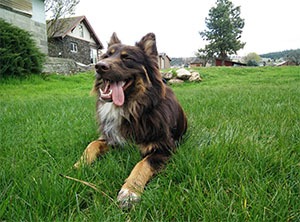 When Hurricane Katrina touched down in 2005, humans were not the only species affected by its destruction. And because emergency relief agencies were not in the business of saving pets, nearly half a million animals were left behind, devastating many owners and causing public outrage on their behalf. Passed in 2006 as a direct result of Hurricane Katrina, the Pet Evacuation and Transportation Act now requires state and local agencies to consider pets and service animals in their emergency preparedness plans. While most of us won't experience a disaster like Hurricane Katrina in our lifetimes, it's still up to us to consider our beloved companion animals when planning for emergencies, big and small. Here are a few things you can do:
When Hurricane Katrina touched down in 2005, humans were not the only species affected by its destruction. And because emergency relief agencies were not in the business of saving pets, nearly half a million animals were left behind, devastating many owners and causing public outrage on their behalf. Passed in 2006 as a direct result of Hurricane Katrina, the Pet Evacuation and Transportation Act now requires state and local agencies to consider pets and service animals in their emergency preparedness plans. While most of us won't experience a disaster like Hurricane Katrina in our lifetimes, it's still up to us to consider our beloved companion animals when planning for emergencies, big and small. Here are a few things you can do:
ID your pet: If your dog gets lost, he won't be able to give his name and number to a good samaritan. Make sure your pet always wears up-to-date ID tags that include your pet's name, your name and phone number. Consider microchipping your pet as an additional precaution; if your pet is rescued by an animal organization they will be able to scan the chip to obtain your information. Finally, carry photos of your pets so that others can help you find and identify them if you are separated.
Stock pet supplies: Just as it's a good idea to keep 72 hours' worth of non-perishables and water for emergency situations, it's also a good idea to set aside extra food (preferably canned), medicine and other necessities for your pets. You may also want to include a pet first aid kit, an extra collar and leash, a blanket, toys, and copies of your pet's medical records, including vaccinations. Finally, invest in a sturdy carrier for your animal that they can be transported easily and have a safe place to rest in the event of an emergency.
Find shelter: If you need to evacuate and cannot stay with your pets, it's important to have a plan to keep them safe and cared for. Check with local animal shelters or pet boarding facilities to see if they accept pets during emergencies, prepare a list of hotels that are pet friendly, or arrange with a friend or family member to keep your pets until you can be together again.
When disaster strikes: If your home or city is not safe for humans, it's probably not safe for pets, either. Ideally, you should take your pets with you when evacuating in an emergency. If this is not possible, use a rescue alert sticker so that emergency workers know there are pets inside your home. (To obtain a free sticker go to aspca.org.) Lastly, remember that the stress and confusion caused by an emergency affects animals just like it affects humans. Comfort your companion animal and don't be surprised if your cat or dog exhibits unusual behavior in a stressful and scary situation.